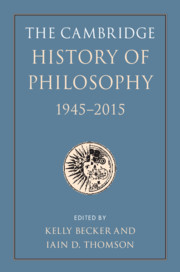Book contents
- The Cambridge History of Philosophy, 1945–2015
- The Cambridge History of Philosophy, 1945–2015
- Copyright page
- Contents
- Contributors
- Preface and Acknowledgments
- Introduction
- Part I Analytic Philosophy
- Section One Language, Mind, Epistemology
- Section Two Logic, Metaphysics, Science
- Section Three Analytic Moral, Social, and Political Philosophy
- 16 The Revival of Virtue Ethics
- 17 Kantian Ethics
- 18 Consequentialism and Its Critics
- 19 The Rediscovery of Metanormativity
- 20 Constitutivism
- 21 John Rawls’s Political Liberalism
- 22 The Twilight of the Liberal Social Contract
- 23 Feminist Philosophy and Real Politics
- Section Four Analytic Aesthetics and Philosophy of Religion
- Part II Continental Philosophy
- Part III Bridge Builders, Border Crossers, Synthesizers, and Comparative Philosophy
- Part IV Epilogue: On the Philosophy of the History of Philosophy
- References
- Index
23 - Feminist Philosophy and Real Politics
Susan Moller Okin on “Multiculturalism”
from Section Three - Analytic Moral, Social, and Political Philosophy
Published online by Cambridge University Press: 08 November 2019
- The Cambridge History of Philosophy, 1945–2015
- The Cambridge History of Philosophy, 1945–2015
- Copyright page
- Contents
- Contributors
- Preface and Acknowledgments
- Introduction
- Part I Analytic Philosophy
- Section One Language, Mind, Epistemology
- Section Two Logic, Metaphysics, Science
- Section Three Analytic Moral, Social, and Political Philosophy
- 16 The Revival of Virtue Ethics
- 17 Kantian Ethics
- 18 Consequentialism and Its Critics
- 19 The Rediscovery of Metanormativity
- 20 Constitutivism
- 21 John Rawls’s Political Liberalism
- 22 The Twilight of the Liberal Social Contract
- 23 Feminist Philosophy and Real Politics
- Section Four Analytic Aesthetics and Philosophy of Religion
- Part II Continental Philosophy
- Part III Bridge Builders, Border Crossers, Synthesizers, and Comparative Philosophy
- Part IV Epilogue: On the Philosophy of the History of Philosophy
- References
- Index
Summary
According to some accounts (Stone 2007; Tuana 2011), feminist philosophy emerges only in the 1970s.1 This claim about the recent emergence of feminist philosophy does not mean, however, that before the 1970s there was no feminist thought. In perhaps the broadest sense – referring to any systematic, principled, or reasoned thought (not necessarily written) that is somehow oriented toward the advancement of the social standing of women or the critique of their subordination – feminist philosophy is probably as old as humanity itself. What is new is, arguably, a certain style of feminist thought that is deemed “philosophical” in a narrower sense – a style marked by a particular kind of abstraction from empirical fact, by a distinctly “normative” character (understood to be somehow different from or to go beyond traditional political advocacy). Concomitant with this new style of thought is the institutional recognition of feminist philosophy as philosophy.
- Type
- Chapter
- Information
- The Cambridge History of Philosophy, 1945–2015 , pp. 310 - 320Publisher: Cambridge University PressPrint publication year: 2019



